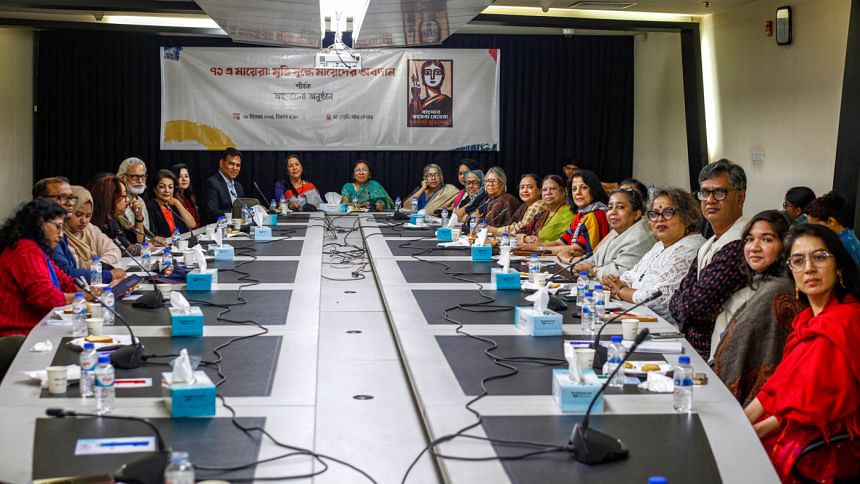Mothers, the unsung heroes of Liberation War

The success of the Liberation War was deeply rooted in the selfless sacrifices and unwavering support provided by the mothers, said speakers at an event yesterday.
While it is often assumed that mothers sent their sons to join the war, many also sent their daughters to fight, the speakers said.
Their involvement extended far beyond providing food and shelter; many stood bravely against the Pakistani forces and even participated in combat.
My mother never feared anything. She always inspired us, saying that we were fighting for our country. With that spirit, she sent us into an unknown future and taught us to protect ourselves if captured.
The discussion, titled "Mothers' Role in the Liberation War," was held at the Daily Star Centre. The event was organised by women freedom fighters.
Shaheen Anam, daughter of freedom fighter Musleha Islam, shared her mother's inspiring story. Musleha not only sheltered freedom fighters in her Dhanmondi home but also donated funds to support them.
"I get very emotional when I remember the heroism of our mothers during the Liberation War. Their contributions must be documented and widely shared. These stories, though crucial to our history, are not well known and must come to the forefront," said Shaheen Anam.
Rizwan Faruk, son of Musleha Islam, recalled how their Dhanmondi home became a hub for freedom fighters, where Molotov cocktails were made by his elder brother Wasif Islam and his friends.
Despite the risks, his mother, a widow at 29, provided support and courage.
Following the military crackdown on March 26, 1971, arms were smuggled into their house for safekeeping.
Rizwan shared the fear of military raids and how his mother comforted them through constant danger.
The tension reached its peak on August 30, 1971, when the military raided their home, arresting freedom fighters and searching for arms. During the raid, his mother was interrogated. She pleaded with the soldiers to spare him, using her fluent Urdu. Miraculously, the major released him, Rizwan recounted.
Cultural activist Lubna Marium referred to her father, Quazi Nooruzzaman, Sector Commander of Sector 7, who documented mothers' contributions in his book.
He wrote about how teenage boys joined the war with dry food, including puffed rice packed by their mothers.
When asked who sent them, they would always say, "Our mothers," she said.
Lubna also shared how her mother, Professor Sultana Zaman, sent her 15-year-old brother Nadeem to join the war.
Despite the challenges, as Nadeem lived in a bunker with insufficient food, her mother never complained about the hardships.
Prothom Alo Associate Editor Shumona Sharmin highlighted her mother Maleka Khan's vital role in rehabilitating women, under the leadership of Sufia Kamal, tortured by Pakistani soldiers .
"My mother worked as a director and handled the survivors' stories with great sensitivity to prevent retraumatising them. She documented their accounts and worked to make them financially independent," Shumona shared.
She added, "These women would come to our house with their sewing and stitching skills. However, my mother always warned us not to ask them about their past, fearing it might reopen their wounds."
Naripokkho founding member Shireen Huq recalled how their home became a sanctuary for freedom fighters.
"My mother always said that if someone sought shelter, we must provide it. I remember our drawing room being packed with people, and everyone managed to coexist despite the challenges. Many non-Bangalee families also sought refuge at our house. At one point, I had to move to my aunt's home because so many people had come seeking shelter," Shireen recounted.
Cultural activist Minu Haque shared how her mother bid her farewell during the war with the words, "We will meet again in Maidan-E-Hashar," praising the bravery of mothers who sent their daughters to join the fight for liberation.
Sufia Kamal's daughters, Sultana Kamal and Syeda Kamal, shared the inspiring story of their mother's unwavering contributions to the movement.
"My mother never feared anything. She always inspired us, saying that we were fighting for our country. With that spirit, she sent us into an unknown future and taught us to protect ourselves if captured," said Syeda Kamal.
Sultana Kamal elaborated on how her mother's involvement in the liberation movement began in 1969 when she started organising neighbourhood women to join the cause.
"When it was decided that my sister and I would cross the border, my mother played a crucial role in encouraging us, even though we had never travelled outside Bangladesh before," Sultana Kamal shared.
Even after the war, Sufia Kamal continued her efforts, working tirelessly to rehabilitate tortured women and ensure they could rebuild their lives in safety and dignity.
Rumana Shafi, daughter of Begum Mushtari Shafi, shared her mother's involvement in the war and the devastating loss of her husband, Dr Mohammad Shafi, and younger brother, Ehsanul Haque Ansari, who were killed by the Pakistani military.
Despite her immense grief, Begum Mushtari continued her work at Swadhin Bangla Betar Kendra until Bangladesh achieved victory on December 16, 1971.
She documented her memories and experiences by writing books about the Liberation War, preserving the stories of sacrifice and resilience for future generations, Rumana said.

 For all latest news, follow The Daily Star's Google News channel.
For all latest news, follow The Daily Star's Google News channel. 



Comments